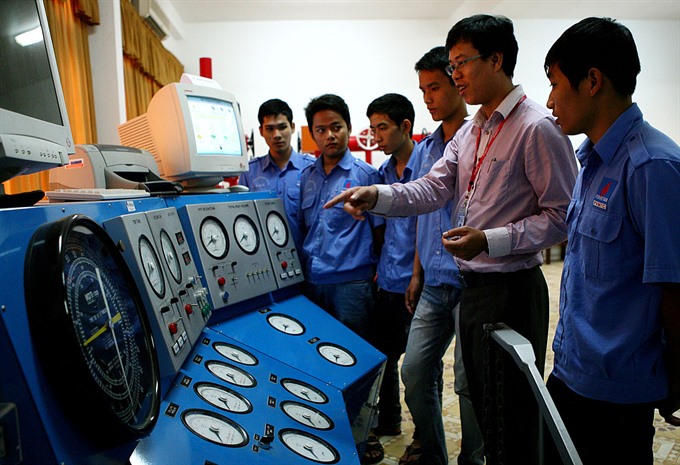
[4 March 2018] - Human resource training, especially the development of high-quality human resources, will be critical to meeting the demands of the fourth industrial revolution, experts say.
Trần Tuấn Anh, minister of Industry and Trade (MoIT), said the new revolution has transformed the country’s model of economic growth from one reliant on the exploitation of natural resources and cheap labour to one focusing on the increase of productivity, production efficiency and the competitiveness of economic sectors.

Anh predicted that the industry and trade sector would be greatly affected the revolution.
“A number of key manufacturing industries such as textiles and footwear will suffer a major impact of the fourth industrial revolution as robots are going to replace humans,” he said at a conference about training a highly-skilled workforce held in Hà Nội this week.
“Humans will monitor and operate the systems and that needs skills and knowledge that can’t be replaced by robots,” said Minister Tuấn Anh.
Kiều Xuân Thực, a professor from Hà Nội University of Industry, agreed, saying low- and medium-skilled workers might lose their jobs if they didn’t adapt quickly to the changes in production.
The Ministry of Industry and Trade manages major industries that contribute up to 70 per cent of the country’s GDP. But training institutions under its leadership still adopt out-of-date methods. Thus, the quality of trained human resources does not meet the requirements of society.
In order to ensure the goal of providing high quality human resources to meet the requirements of smart production in the future, Anh said, it was necessary to transform training methods and increase the application of information and digital technology in teaching activities.
More attention should be paid to enhance the quality and competence of teachers and management officials.
“Outdated training methods should no longer be used as they lack interaction and contact with reality, and could lead to backwardness,” he said.
In the face of rapid changes caused by the fourth industrial revolution, the economy must boost investment, exploit all resources effectively and gradually move from a cheap labour force into a more skilled one.
According to him, the government must consider the impact from various free trade agreements if Việt Nam aims to be a global supplier of a skilled workforce.
“The government has directed agencies to carry out research about the impacts and potentials of the revolution,” Anh was quoted by the Voice of Vietnam as saying.
In May last year, the Prime Minister Nguyễn Xuân Phúc issued Directive 16 about improving the country’s ability, setting up short and long-term goals and tasks for state agencies.
Addressing the conference, Nguyễn Manh Hùng, General Director of Military Industry and Telecoms Group (Viettel) said to catch up with the fourth industrial revolution, the teaching methods should be renovated.
In the past, the training of high quality human resources such as university students took time and money. But now, students can practice online, cutting costs and achieving good results.
According to him, the training programmes of the school should be linked to the whole world. Schools should act like factories so that students have the opportunity to practice.
Unlike the past, students should practice before learning theories.
Teachers are not only instructors but also “coaches” who turned their students into “athletes” working towards good performance, he said.
Hùng also said teaching should cover all sectors, instead of forcing students to focus on a major.
“In the past, students are taught languages which are used to communicate between people, such as Vietnamese or English. But now, it is necessary for them to know the programming language -- the language used to instruct the machine. Workers only act as machine’s supervisor. " — VNS
 Ministries tougher on measures by business for not to harm the environment (29/01/2018)
Ministries tougher on measures by business for not to harm the environment (29/01/2018)
 GSO Survey: Business Optimistic in 2018 (01/01/2018)
GSO Survey: Business Optimistic in 2018 (01/01/2018)
 Hike in prediction for Vietnam GDP growth (12/12/2017)
Hike in prediction for Vietnam GDP growth (12/12/2017)
 More SOEs set for equitisation (20/11/2017)
More SOEs set for equitisation (20/11/2017)
 Informal workers vulnerable and unprotected (15/10/2017)
Informal workers vulnerable and unprotected (15/10/2017)
 WB forecast: GDP target will not be met (04/09/2017)
WB forecast: GDP target will not be met (04/09/2017)
 Prime Minister reaffirms growth target amidst private sector headways (04/08/2017)
Prime Minister reaffirms growth target amidst private sector headways (04/08/2017)
 "Business as usual" won’t drive growth (29/06/2017)
"Business as usual" won’t drive growth (29/06/2017)
 Domestic private sector barred from power market (12/05/2017)
Domestic private sector barred from power market (12/05/2017)
 Intellectual property key for firms (27/04/2017)
Intellectual property key for firms (27/04/2017)